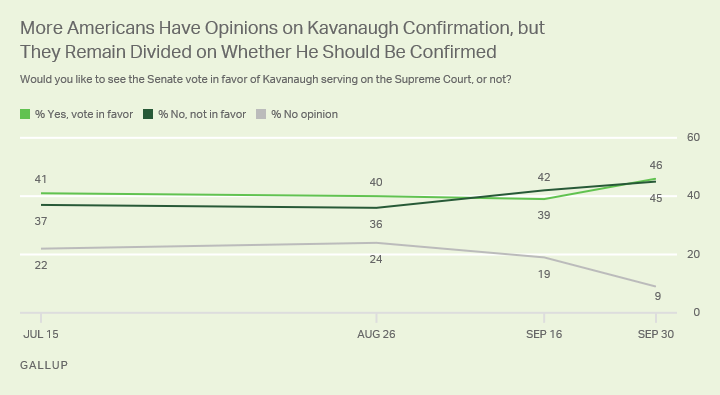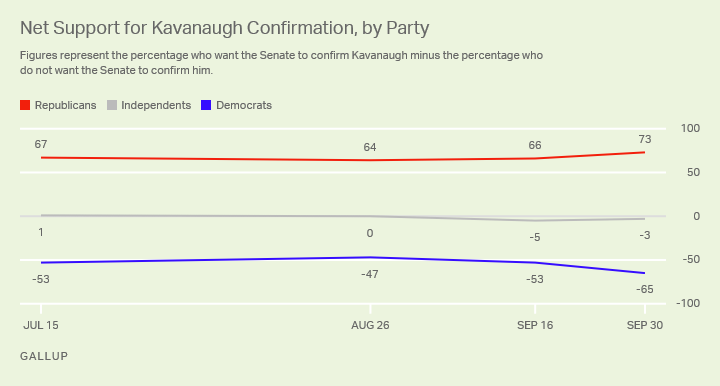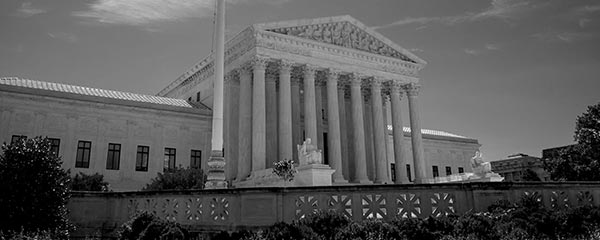Story Highlights
- 46% say Kavanaugh should be confirmed; 45% say he should not be
- More Americans now have opinions on the matter
- Opinions among Republicans, Democrats grow farther apart
WASHINGTON, D.C. -- During a week in which Supreme Court nominee Brett Kavanaugh defended himself before the Senate against sexual assault allegations, a growing percentage of Americans now have an opinion about whether he should be confirmed. Currently, 46% of Americans are in favor of the Senate confirming Kavanaugh and 45% are opposed, with 9% having no opinion. Three prior polls conducted between July and mid-September showed close divisions of opinion, but with more than twice as many as now having no opinion.

As the Kavanaugh drama has unfolded in recent weeks, public opinion has consistently been divided, with no more than a four-percentage-point margin in favor of his confirmation and a three-point margin against it measured in four separate surveys.
The latest results are based on ���۴�ýpolling the week of Sept. 24-30. On Sept. 27, Kavanaugh and his accuser, Dr. Christine Blasey Ford, testified before the Senate. A comparison of the polling conducted in the three days prior to their testimony and the four days afterward showed no apparent change in the gap in favor of, and against, confirmation. The major impact of the testimony appeared to be a sharp drop in the percentage not having an opinion on the matter, observed in the days after the hearings, accompanied by roughly equal increases in support and opposition.
One major reason why opinions about Kavanaugh's confirmation have been relatively stable is that Republicans and Democrats have held diametrically opposed views on the matter. Whereas 84% of Republicans want Kavanaugh confirmed, 78% of Democrats want the Senate to reject his nomination. Independents are about equally divided, with 43% in favor and 46% opposed to the Senate confirming Kavanaugh.
Republicans' and Democrats' opinions have become increasingly polarized in the latest survey. Democrats' net support for Kavanaugh's confirmation is now at -65 points (13% in favor and 78% opposed), down from -53 points (14% in favor and 67% opposed) in July.
Likewise, Republicans' net support for Kavanaugh has grown to 73 points (84% in favor and 11% opposed), from 67 points (76% to 9%) in July. Independents have been divided throughout the process, although in the last two surveys slightly more have been opposed than in favor.

The current 71-point gap in the percentage of Republicans (84%) and Democrats (13%) who want Kavanaugh confirmed is the largest ���۴�ýhas measured for a Supreme Court nominee to date, by nearly 20 points. The largest party gaps for Supreme Court nominees before now, based on Gallup's final measurement in polling, were just over 50 points, for Neil Gorsuch, Sonia Sotomayor and Samuel Alito.
| Republicans | Independents | Democrats | Gap (Rep-Dem) | ||||||||||||||||||||||||||||||||||||||||||||||||||||||||||||||||||||||||||||||||||||||||||||||||
|---|---|---|---|---|---|---|---|---|---|---|---|---|---|---|---|---|---|---|---|---|---|---|---|---|---|---|---|---|---|---|---|---|---|---|---|---|---|---|---|---|---|---|---|---|---|---|---|---|---|---|---|---|---|---|---|---|---|---|---|---|---|---|---|---|---|---|---|---|---|---|---|---|---|---|---|---|---|---|---|---|---|---|---|---|---|---|---|---|---|---|---|---|---|---|---|---|---|---|---|
| % | % | % | pct. pts. | ||||||||||||||||||||||||||||||||||||||||||||||||||||||||||||||||||||||||||||||||||||||||||||||||
| Kavanaugh | 84 | 43 | 13 | 71 | |||||||||||||||||||||||||||||||||||||||||||||||||||||||||||||||||||||||||||||||||||||||||||||||
| Gorsuch | 74 | 44 | 21 | 53 | |||||||||||||||||||||||||||||||||||||||||||||||||||||||||||||||||||||||||||||||||||||||||||||||
| Garland | 33 | 44 | 76 | -43 | |||||||||||||||||||||||||||||||||||||||||||||||||||||||||||||||||||||||||||||||||||||||||||||||
| Kagan | 23 | 45 | 70 | -47 | |||||||||||||||||||||||||||||||||||||||||||||||||||||||||||||||||||||||||||||||||||||||||||||||
| Sotomayor | 28 | 52 | 80 | -52 | |||||||||||||||||||||||||||||||||||||||||||||||||||||||||||||||||||||||||||||||||||||||||||||||
| Alito | 82 | 50 | 31 | 51 | |||||||||||||||||||||||||||||||||||||||||||||||||||||||||||||||||||||||||||||||||||||||||||||||
| Miers | 66 | 37 | 23 | 43 | |||||||||||||||||||||||||||||||||||||||||||||||||||||||||||||||||||||||||||||||||||||||||||||||
| Roberts | 82 | 60 | 44 | 38 | |||||||||||||||||||||||||||||||||||||||||||||||||||||||||||||||||||||||||||||||||||||||||||||||
| Ginsburg | 41 | 52 | 65 | -24 | |||||||||||||||||||||||||||||||||||||||||||||||||||||||||||||||||||||||||||||||||||||||||||||||
| Thomas | 75 | 51 | 48 | 27 | |||||||||||||||||||||||||||||||||||||||||||||||||||||||||||||||||||||||||||||||||||||||||||||||
| Kavanaugh reading is the latest, from Sept. 24-30. ���۴�ýdid not measure support for the nomination of Stephen Breyer. Data by party are not available for the final poll on the nomination of Robert Bork. | |||||||||||||||||||||||||||||||||||||||||||||||||||||||||||||||||||||||||||||||||||||||||||||||||||
| Gallup | |||||||||||||||||||||||||||||||||||||||||||||||||||||||||||||||||||||||||||||||||||||||||||||||||||
Margin in Support of Recent Justices Typically Exceeded 20 Points
Americans have generally been supportive of Supreme Court nominees in the past. For the seven most recently confirmed justices about whom ���۴�ýhas polled, support has exceeded opposition by an average 24 points. Those margins have shrunk in recent years, to as low as 10 percentage points for Elena Kagan, with Gorsuch and Sotomayor also below the historical average.
| Vote in favor | Not vote in favor | No opinion | Margin in favor of confirmation | ||||||||||||||||||||||||||||||||||||||||||||||||||||||||||||||||||||||||||||||||||||||||||||||||
|---|---|---|---|---|---|---|---|---|---|---|---|---|---|---|---|---|---|---|---|---|---|---|---|---|---|---|---|---|---|---|---|---|---|---|---|---|---|---|---|---|---|---|---|---|---|---|---|---|---|---|---|---|---|---|---|---|---|---|---|---|---|---|---|---|---|---|---|---|---|---|---|---|---|---|---|---|---|---|---|---|---|---|---|---|---|---|---|---|---|---|---|---|---|---|---|---|---|---|---|
| % | % | % | pct. pts. | ||||||||||||||||||||||||||||||||||||||||||||||||||||||||||||||||||||||||||||||||||||||||||||||||
| Gorsuch | 45 | 32 | 23 | 13 | |||||||||||||||||||||||||||||||||||||||||||||||||||||||||||||||||||||||||||||||||||||||||||||||
| Kagan | 46 | 36 | 18 | 10 | |||||||||||||||||||||||||||||||||||||||||||||||||||||||||||||||||||||||||||||||||||||||||||||||
| Sotomayor | 55 | 36 | 9 | 19 | |||||||||||||||||||||||||||||||||||||||||||||||||||||||||||||||||||||||||||||||||||||||||||||||
| Alito | 54 | 30 | 16 | 24 | |||||||||||||||||||||||||||||||||||||||||||||||||||||||||||||||||||||||||||||||||||||||||||||||
| Roberts | 60 | 26 | 14 | 34 | |||||||||||||||||||||||||||||||||||||||||||||||||||||||||||||||||||||||||||||||||||||||||||||||
| Ginsburg | 53 | 14 | 33 | 39 | |||||||||||||||||||||||||||||||||||||||||||||||||||||||||||||||||||||||||||||||||||||||||||||||
| Thomas | 58 | 30 | 12 | 28 | |||||||||||||||||||||||||||||||||||||||||||||||||||||||||||||||||||||||||||||||||||||||||||||||
| ���۴�ýdid not measure support for the nominations of Anthony Kennedy, David Souter or Stephen Breyer. ���۴�ýmeasured support for Neil Gorsuch and Ruth Bader Ginsburg just once, shortly after each was first nominated. | |||||||||||||||||||||||||||||||||||||||||||||||||||||||||||||||||||||||||||||||||||||||||||||||||||
| Gallup | |||||||||||||||||||||||||||||||||||||||||||||||||||||||||||||||||||||||||||||||||||||||||||||||||||
Kavanaugh is just the third recent nominee for whom preferences about confirmation are closely divided. One of those, Robert Bork in 1987, had his nomination rejected in the Senate vote. Thirty-eight percent of Americans were in favor and 35% opposed to the Senate confirming Bork's nomination in the final survey before the Senate vote. The other, Harriet Miers in 2005, had her nomination withdrawn prior to the Senate taking action. Just before the withdrawal, 42% of Americans wanted to see the Senate confirm Miers and 43% did not.
At 9%, the percentage having no opinion about the Kavanaugh confirmation ties as the lowest ���۴�ýhas measured for a Supreme Court nominee, with Sotomayor in 2009. After the highly publicized hearings on Clarence Thomas' sexual harassment allegations in 1991, 12% were undecided about whether he should be confirmed.
The average "no opinion" percentage in Gallup's final survey for 10 prior Supreme Court nominees dating back to 1987 -- including Bork, Miers and Merrick Garland (whose 2016 nomination was not considered by the Senate) -- is 19%.
Bottom Line
Senate action on the Kavanaugh nomination has been delayed twice in recent weeks, first by reopening the hearings to hear Ford's and Kavanaugh's testimony on the sexual assault allegations, and more recently by the Senate agreeing to delay a vote until the FBI could investigate those and other allegations. The investigation is supposed to conclude this week, and the full Senate vote to confirm or reject the nomination should follow quickly.
At this point, Kavanaugh's confirmation is far from certain. However, given that most Democratic senators have indicated they will vote against his confirmation and most Republican senators have maintained they will vote for it, the vote will undoubtedly be close.
To date, prior Supreme Court nominees who were successfully confirmed enjoyed significantly more public support than opposition. Thus, Kavanaugh and his supporters are hoping to break that historical precedent. No prior nominee has been as politically polarizing as Kavanaugh, and that pattern was well-established long before sexual assault allegations against him surfaced. Those allegations have apparently done little to change the balance of public opinion on whether Kavanaugh should be confirmed, perhaps because Republicans are inclined to give him the benefit of the doubt and Democrats are inclined to believe Ford and the other accusers. Americans who were previously undecided are largely splitting evenly between support and opposition.
In an era where nominees can be confirmed with a simple majority vote, the division of opinion on Kavanaugh nationally may matter less than his maintaining widespread support from Republicans. The few remaining undecided Republican senators have clear direction from the party's supporters, if not from the American public more generally, about how to vote. They must weigh these political considerations with their personal judgment about whether Kavanaugh should be seated on the Supreme Court.
View complete question responses and trends.
Learn more about how the works.




